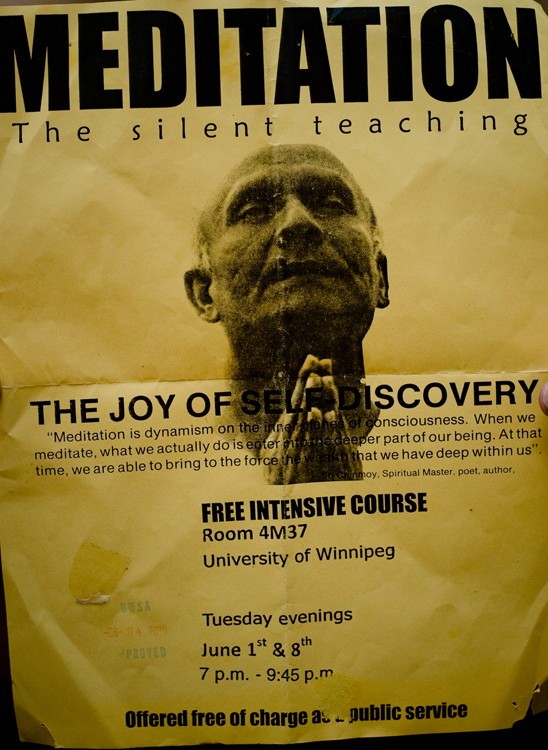Worldwide centre providing ‘free meditation’ service years after leader’s death
Members of Winnipeg’s Sri Chinmoy Centre offer spiritual sessions for students, community
Twice a year, posters advertising “free meditation” are posted at the University of Winnipeg with no information regarding who is providing the service or how to contact them.
In reality, those running the sessions are followers of a spiritual leader who has been dead for three years.
The classes are provided by members of the Sri Chinmoy Centre (SCC), a worldwide group started in 1964 when Sri Chinmoy (born Chinmoy Kumar Ghose in 1931) moved from Bangladesh to New York to open the first centre.
The SCC has grown to over 400 centres in 80 countries, including a location in Winnipeg. The centre has been providing classes to the community out of the U of W since 1986.
Sri Chinmoy passed away in 2007.
Shishir, a SCC member, whose real name is Rob, instructed the meditation class at the U of W on Sept. 17 and 18 along with Purnakama, another SCC member.
Shishir stated a person does not need to leave his or her own religion to meditate with the SCC. He was raised Catholic and still goes to mass with his mother on Sundays.
“No matter what tradition you come from, the goal of meditating is to still the mind,” said Shishir. “We teach meditation through various techniques – visualization, mantra, breathing, concentration and music.”
Shishir was not asked directly by Chinmoy to become a teacher, but he does not see that as an issue.
“Sri Chinmoy is my meditation teacher,” said Shishir “(He) taught me and I pass on his teachings. I knew him for 28 years,” he said.
Gary Falk, an ex-SCC member from New York, said he thinks it’s ironic that the disciples go around giving these classes considering Chinmoy has been dead for three years.
“The only form of meditation at the (SCC) was concentrating on his picture, him in his most exalted state – concentrating on him, only thinking of him,” he said. “He is the object of all your attention and importance, do what he tells you to do. With Chinmoy gone, what is the focus?”
Falk was a SCC member from 1970 to 1980 and lived in the same house as Chinmoy.
He believes the sessions are a way to get people to join the SCC. He explained that when people are in a vulnerable state and searching for something to fulfill their lives, meditation can be very appealing.
“When you join the (SCC) centre you’re encouraged to cut ties with family and friends,” Falk said. “When I left I had no family, no contacts – nobody to go home to.”
The two-day session in September at U of W was attended by students and community members of all ages, as well as of different races and beliefs.
Some who attended left with positive impressions.
“They were very knowledgeable and dedicated to their practice,” said Kathie Josephson, a community member who attended all three classes that weekend. “They offered different alternatives to meditation and you spend a significant amount of time getting feedback.”
Josephson had taken some meditation classes when she was a student and said it is a good thing to offer in the university to relieve stress.
Even though she may not continue with the teachings of the SCC, Josephson appreciated the free service offered by the group to encourage spiritual growth in the community.
With files from Andrew McMonagle.
Published in Volume 65, Number 9 of The Uniter (October 28, 2010)







